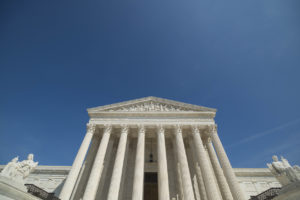The United States Supreme Court has granted a petition for certiorari in Coinbase v. Suski to review the question of whether the court or the arbitrator should determine whether an arbitration agreement containing a delegation clause can be narrowed by a subsequent agreement that does not contain clauses addressing arbitration or delegation. There is currently a circuit split as to the enforceability of delegation clauses, which are clauses that dictate the arbitrator is authorized to determine threshold issues regarding the arbitration agreement. Currently the First and Fifth Circuits recognize the enforceability of delegation clauses and would allow an arbitrator to decide whether a subsequent agreement narrows the arbitration agreement in a prior agreement, while the Third and Ninth Circuits refuse to enforce delegation clauses where a second agreement narrows an earlier arbitration agreement.
In this case, users of Coinbase, a cryptocurrency exchange, filed a class action in California claiming that Coinbase had misled them regarding the entry requirements for a sweepstakes in violation of state law. Suski v. Coinbase, Inc., 55 F.4th 1227, 1228 (9th Cir. 2022), cert. granted, Coinbase, Inc. v. Suski, No. 23-3, 2023 WL 7266998 (U.S. Nov. 3, 2023). The suit was filed under California’s False Advertising Law, Unfair Competition Law, and Consumer Legal Remedies Act against Coinbase and Marden-Kane Inc., a company hired by Coinbase to design, market, and execute a sweepstakes that the plaintiffs claimed used deceptive practices. Id. at 1229. When creating their accounts with Coinbase, the plaintiffs had signed Coinbase’s User Agreement, which contains an arbitration provision that specifically provided the arbitrator would decide issues relating to the “scope” of the arbitration provision—i.e., the types of claims it covered, not whether it was superseded by a later agreement between the parties. Id. at 1229. Thereafter, the plaintiffs had opted into a second contract, the Coinbase Sweepstakes’ Official Rules, which included a forum selection clause providing that California courts have exclusive jurisdiction over any controversies regarding the sweepstakes. Id. at 1228–29.
Coinbase moved to compel arbitration in reliance upon the arbitration clauses set forth in the underlying user agreements, and the class plaintiffs opposed arbitration, pointing to provisions contained in the sweepstakes’ rules that were issued subsequent thereto containing contrary forum selection clauses. Id. at 1229. The district court denied the motion to compel arbitration, and the U.S. Court of Appeals for the Ninth Circuit affirmed the district court’s holding. Id. In affirming the district court, the Ninth Circuit made distinctions between the arbitration delegation clause in Coinbase’s User Agreement and the forum selection clause contained in the Sweepstakes’ Official Rules. Id. at 1229–31.
Regarding the delegation clause, which stated that an arbitrator shall decide “disputes arising out of or related to the interpretation or application of the Arbitration Agreement,” Coinbase argued that the issue of any superseding effect of the Sweepstakes’ Official Rules concerned the scope of the arbitration clause and therefore fell within the User Agreement’s delegation clause. Id. at 1229. In denying the motion to compel arbitration, both the district court and the Ninth Circuit determined that the question concerning the “scope of the arbitration agreement” referred to how widely it could be applied, and as such this was an issue for the court to decide. Id. The Ninth Circuit found that “[w]hether the court or the arbitrator decides arbitrability is an issue for judicial determination unless the parties clearly and unmistakably provide otherwise.” Id. (quoting Oracle Am. Inc. v.Myriad Grp. A.G.,724 F.3d1069, 1072 (9th Cir. 2013)). In the Ninth Circuit’s view, the issue of whether the forum selection clause in the Sweepstakes’ Official Rules superseded the arbitration clause in the User Agreement was not delegated to the arbitrator, but rather was for the court to decide. Id.
The Court next looked to whether the forum selection clause in the Sweepstakes’ Official Rules superseded the arbitration clause in the User Agreement. Id. at 1230. The forum selection clause in the Sweepstakes’ Official Rules had provided that the California courts had exclusive jurisdiction over any controversies regarding the sweepstakes. Id. Coinbase argued that the User Agreement contained an integration clause and procedures for amendment of the User Agreement, and therefore the User Agreement could not have been superseded by the Official Rules, which Plaintiff argued exempted the claims from arbitration. Id. at 1231. Coinbase further argued that the Official Rules were focused on a different subject matter from the User Agreement and as such could not be utilized as evidence of the parties’ intent to amend, revise, revoke, or supersede any prior agreement, including the arbitration provision in the User Agreement. Id.
The Ninth Circuit did not agree with Coinbase. Id. Rather, the Court found that under California law, “[t]he general rule is that when parties enter into a second contract dealing with the same subject matter as their first contract without stating whether the second contract operates to discharge or substitute for the first contract, the two contracts must be interpreted together and the latter contract prevails to the extent they are inconsistent.” Id. at 1230 (quoting Capili v. Finish Line, Inc.,116 F. Supp. 3d 1000, 1004 n.1 (N.D. Cal 2015) (quoting 17A C.J.S. Contracts § 574), aff’d, 699 F. Appx. 620 (9th Cir.2017)). The Court acknowledged that Coinbase was correct in stating that the Official Rules contained no language specifically revoking the arbitration agreement contained within the User Agreement, but it found that by including the forum selection clause with the Official Rules, those Rules provided evidence of the parties’ intent not to be governed by the User Agreement’s arbitration clause when addressing controversies concerning the sweepstakes. Id. at 1230–31. As a result, the Ninth Circuit affirmed the district court’s holding that denied Coinbase’s request to compel arbitration. Id. at 1231.
In its petition for a writ of certiorari, Coinbase pointed to Supreme Court precedent requiring the enforcement of delegation clauses in arbitration agreements and argued that absent a meritorious challenge to these provisions, they must be enforced if the subsequent agreement does not alter that provision. Brief for Petitioner at 20–21, Suski v. Coinbase, Inc., 55 F.4th 1227, 1228 (9th Cir. 2022) (No. 22-105), 2022 WL 3107708. Coinbase has also argued that since the subsequent rules did not alter or challenge the prior agreement’s delegation provision, it is for the arbitrator to determine this issue. Id. at 9. On November 3, 2023, the Supreme Court granted the petition for writ of certiorari, and the case is scheduled for argument during the Court’s current term. Coinbase, Inc. v. Suski, No. 23-3, 2023 WL 7266998 (U.S. Nov. 3, 2023).
This will be the second time that a decision rendered concerning this dispute involving Coinbase has appeared on the Supreme Court’s docket; the Court previously determined that an appeal from a denial of a petition to compel arbitration automatically stays the proceedings below. Coinbase, Inc. v. Bielski, 599 U.S. 736, 747 (2023). Further, this is the second arbitration case that the Supreme Court has agreed to hear this term, along with Bissonnette v. LePage Bakeries Park St. LLC, 49 F.4th 655 (2d Cir. 2022), cert. granted, No. 23-51, 2023 WL 6319660 (U.S. Sept. 29, 2023). Once again, issues concerning arbitration appear to remain hot topics before the Supreme Court.











